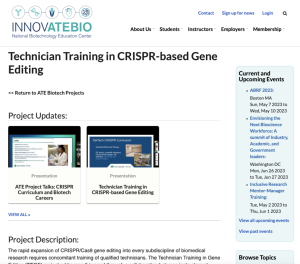Technician Training in CRISPR-based Gene Editing

CRISPR-based gene editing is revolutionizing biological research as a mechanism to efficiently and precisely modify the genome of almost any organism. As a result of the wide incorporation of CRISPER-based technologies in genetic engineering, there is a need for a biotechnology workforce that is trained in its use. Community colleges are adept at meeting rapidly changing workforce needs such as this. To this end, Delaware Technical Community College proposes to develop and incorporate CRISPR-based gene editing training into its biotechnology curriculum. This work will be done in collaboration with the Gene Editing Institute at ChristianaCare, a Delaware-based healthcare organization. The project also aims to provide workshops to train community college faculty across the nation in CRISPR-based gene editing techniques. The trained faculty can in turn educate large numbers of students about this gene editing technique, to better prepare students for the current biotechnology workforce.
This partnership combines the content expertise of staff at the Gene Editing Institute with that of faculty at Delaware Technical Community College to develop and implement a high impact CRISPR-based gene editing curriculum and to offer training workshops for faculty. The project includes engagement with industry partners and national experts in bioethics. The professional development workshops will enable participants to broaden biotechnology instruction related to CRISPR use, as well related ethical issues. Through these activities, the project expects to serve nearly 100 bioscience students at Delaware Technical Community College and 90 community college faculty. The intention is to help students gain the knowledge and skills needed to contribute to a rapidly expanding field with a wide range of applications. The specific aims of the project are to: (1) continue to update and provide effective training in state-of-the-art gene editing techniques to prepare students in a two-year biotechnology program to enter bioscience careers or further education; (2) disseminate an advanced, current curriculum and model high impact teaching practices to community college instructors through three and five day gene editing workshops. The employability skills of graduates will be strengthened and broadened with the use of classroom activities that involve analysis and interpretation of bioinformatic data, technical oral presentations, understanding and evaluation of scientific literature, and group work as examples. As a result of these efforts, the project team expects to contribute to the national need for technicians who are skilled in gene editing technologies.
Comments